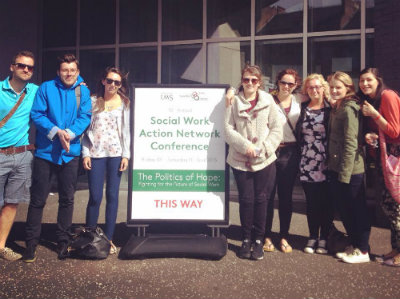
By Lewis Roberts, social work student, Northumbria University
Social work students are regularly told about the value of collective action and fighting structural inequalities, but in reality, few have practical experience of engaging with social justice issues. Lecturers often describe a radical approach to social work, but for many students preparing to enter a workforce constrained by austerity and neoliberalism; this can be an abstract concept.
At Northumbria University (NU), a group of students have attempted to address some of these challenges by setting up a social work society.
‘Challenge policies and structural inequalities’
NU Social Work Society was set up by students for students to provide opportunities for peer networking and encourage engagement with social change and social justice issues.
The project began with informal conversations in our peer group where we discussed our different experiences of community engagement and community activism.
It became clear that we had a shared vision; that our collective voice can empower, connect and encourage students to challenge policies and structural inequalities that undermine the health and well-being of those that use social work services.
Sharing and learning
We offer support to our members and engage with the local community in a number of ways.
We have drawn on our local networks to arrange free information sharing events on current topics and debates.These sessions evolved and we decided to host “learning events’ – our first one was in March. We collaborated with local community project Action on Impulse. They ran a service user-led session on understanding and supporting children and young people with ADHD.
We are planning another service-used led session on Tourette Syndrome, and facilitating one ourselves on social media and social work. We intend to bring in a range of guest speakers, including those who offer a more radical perspective on social work practice.
The society is still fairly new and growing but we plan on collaborating with other health and social care societies such as occupational therapy and mental health nursing, as well as reaching out to other social work students and NQSWs.
Support and inspiration
We have drawn funding from Northumbria Student Union and held fundraising events so we can offer financial assistance to members attending conferences, for example the Social Work Action Network conference in Glasgow, or demonstrations such as anti-Fascist protests against Pegida in Newcastle.
One recent conference was the @iamsocialwork event in Newcastle in February. We left feeling inspired as the event helped us to think about the value and power of collective networks.
We met academic Amanda Taylor (@amltaylor66) from the University Of Central Lancashire who was really interested in our project and encouraged us to share it with other students. Her support prompted us to write this piece and also it helped to reaffirm the value of our project.
We have also formed close ties with a charity whose values link with ours. Journey to Justice aims to inspire people through learning from past and present human rights struggles to take action for social justice. Our members have held a fundraiser and volunteer at events.
The positives of social media
A key theme of the @iamsocialwork event was the use of social media. Discussions around social media at university can often focus on boundaries and, in particular, cases where students have crossed these.
However, the conference demonstrated the extent to which platforms such as Twitter can help form partnerships and facilitate exchange of knowledge. We decided that we needed to be less risk averse and have a greater social media presence to continue connecting with the next generation of social workers.
Communicate, collaborate, connect
We call on social work students elsewhere to set up a social work society. Our logo represents what we are trying to achieve and can be used as a model for setting up a group: communicate your ideas for change, collaborate with your peers and connect with others.
- Communicate: Have a conversation with your peers about social justice and the power of collective action. Contact your Student Union and set up a social work society
- Collaborate: Establish a committee and decide on priorities. Promote the society and ensure it is representative of all students.
- Connect: Set up social media channels and begin to connect with local agencies and student groups. Engage in local/national collective action and change society!
We are at the beginning of an exciting journey but our vision is clear. We aim to continue connecting and giving students a collective voice and encouraging other students and newly qualified social workers to do the same.
Take a chance; be proactive, do something different. Let’s begin a movement that brings the social work profession closer together and helps us fight for social justice.
Find out more on Twitter @nu_sws, Facebook, or email lewis.o.roberts@northumbria.ac.uk
You can join our Stand up for Social Work campaign by:
- Taking one action and telling us what it is
- Sharing this article
- Sharing what you’ve done to make a difference today
- Writing a letter to your MP
- Changing your profile picture

 This article is part of Community Care’s Stand up for Social Work campaign. We’re standing up for social work by being honest, offering support and providing inspiration.
This article is part of Community Care’s Stand up for Social Work campaign. We’re standing up for social work by being honest, offering support and providing inspiration.
 Sara Sharif case review begins after father and stepmother convicted of murder
Sara Sharif case review begins after father and stepmother convicted of murder 
 Facebook
Facebook X
X LinkedIn
LinkedIn Instagram
Instagram
Comments are closed.